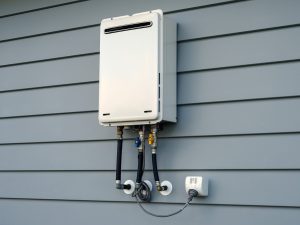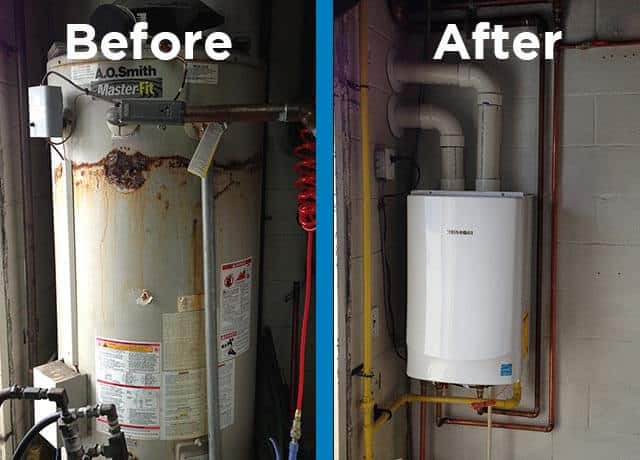Tankless water heaters, also known as on-demand water heaters, have been gaining popularity in recent years for their efficiency, convenience, and space-saving benefits. Unlike traditional water heaters, which store a large volume of hot water in a tank, tankless models heat water only when it’s needed, eliminating the need for a bulky storage tank. In this article, we’ll explore the many benefits of tankless water heaters, highlighting why they may be the perfect upgrade for your home.
What is a Tankless Water Heater?
Before we dive into the advantages, let’s first define what a tankless water heater is and how it works. A tankless water heater is a modern alternative to the traditional tank-style water heater. Instead of constantly heating and storing hot water in a tank, a tankless unit heats water on demand as it passes through the system. This means you’ll have hot water whenever you need it, without the risk of running out.
Tankless water heaters can be powered by gas or electricity and are available in a variety of sizes to accommodate different household needs. They are typically installed at the point of use, such as near a bathroom or kitchen, or centrally located in the home.
Key Benefits of Tankless Water Heaters
Now that we have a better understanding of tankless water heaters, let’s take a closer look at the key benefits that make them a popular choice for homeowners.
1. Energy Efficiency and Cost Savings
One of the primary advantages of tankless water heaters is their energy efficiency. Traditional water heaters constantly heat a large volume of water, even when it’s not being used, leading to significant energy waste. This process, known as standby heat loss, can account for up to 20% of your energy bill.

Tankless water heaters, on the other hand, only heat water when you need it, meaning they don’t suffer from standby heat loss. This on-demand heating system is much more energy-efficient, leading to lower utility bills. According to the U.S. Department of Energy, tankless water heaters can be up to 34% more energy-efficient than traditional models in homes that use 41 gallons or less of hot water per day. This percentage increases in larger households or for homes that use a lot of hot water.
2. Unlimited Hot Water Supply
With a traditional water heater, you’re limited by the size of the tank. Once the hot water runs out, you’ll have to wait for the tank to refill and heat the water again, which can be frustrating, especially during peak usage times like morning showers or washing dishes.
Tankless water heaters eliminate this issue. Because they heat water on demand, you’ll never run out of hot water. Whether you’re running multiple showers, doing laundry, or washing dishes, a tankless water heater can supply an endless stream of hot water, so you don’t have to worry about running out.
3. Space Saving and Compact Design
Traditional water heaters require a large tank that takes up valuable space in your home. This can be especially problematic for homeowners with limited space or those who want to maximize their living area. Tankless water heaters, however, are much smaller and can be installed in tighter spaces, such as closets, utility rooms, or even on the exterior of your home.
The compact design of tankless water heaters makes them an excellent choice for homes with limited space. By freeing up space that would have been occupied by a bulky tank, you’ll have more room for other purposes. Additionally, tankless models are wall-mounted, which further conserves floor space.
4. Longer Lifespan
Tankless water heaters tend to have a longer lifespan than traditional water heaters. While traditional water heaters typically last around 10 to 15 years, a tankless water heater can last 20 years or more with proper maintenance. This means you’ll get more value for your investment over time.
The extended lifespan of tankless water heaters is due to the fact that they don’t store hot water, reducing the risk of corrosion, mineral buildup, and other issues that can shorten the lifespan of a tank-style water heater. Regular maintenance, such as descaling the unit annually, can help ensure that your tankless water heater continues to perform optimally for many years.
5. Environmentally Friendly
For homeowners who are concerned about their environmental impact, tankless water heaters offer a greener alternative to traditional models. Since tankless water heaters use less energy by heating water only when needed, they help reduce your overall energy consumption. As a result, you’ll lower your carbon footprint and contribute to a more sustainable household.
In addition to being more energy-efficient, tankless water heaters are also more environmentally friendly because they don’t require the use of a large storage tank, which can eventually be disposed of and contribute to landfill waste. The long lifespan and energy efficiency of tankless units make them a more sustainable choice overall.
6. Improved Water Quality
Traditional water heaters store water in a tank, which can lead to the buildup of sediment, rust, and other minerals over time. This sediment can affect the quality of the water coming from your taps, leading to poor water quality and potential clogs.
Tankless water heaters, however, don’t store water, meaning there is less chance for sediment buildup. This helps maintain better water quality over the long term. With a tankless unit, you’ll be able to enjoy cleaner, fresher water without the worries of sediment and mineral buildup affecting your plumbing system.
How to Choose the Right Tankless Water Heater for Your Home
Now that you know the many benefits of tankless water heaters, it’s important to choose the right one for your home. There are several factors to consider when selecting a tankless water heater, including size, energy source, and flow rate.
1. Size and Flow Rate
The size of your tankless water heater will depend on the size of your home and the number of people in your household. You’ll also need to consider the flow rate, which refers to how much hot water the unit can provide at once. Flow rate is measured in gallons per minute (GPM), and it’s essential to choose a unit with a flow rate that meets your household’s needs. For example, a household with multiple bathrooms and high hot water demand may need a larger unit with a higher flow rate.
2. Energy Source
Tankless water heaters can be powered by either electricity or natural gas. Gas-powered units tend to be more powerful and better suited for larger homes with high hot water demand. Electric units are typically smaller, easier to install, and more energy-efficient, making them a great option for smaller homes or those looking to save on installation costs.
3. Installation Considerations
Tankless water heaters generally require professional installation to ensure they are correctly sized and positioned for optimal performance. It’s important to work with a licensed plumber who can evaluate your home’s plumbing and electrical systems to ensure your new unit is installed properly.
Conclusion
Tankless water heaters offer a wide range of benefits, from energy efficiency and cost savings to endless hot water and space-saving design. By upgrading to a tankless water heater, you can enjoy a more sustainable and efficient home while also improving your water quality and reducing your environmental impact. If you’re considering a new water heater for your home, a tankless model is definitely worth exploring. With the right size and installation, you’ll experience the many advantages that this modern technology has to offer.

